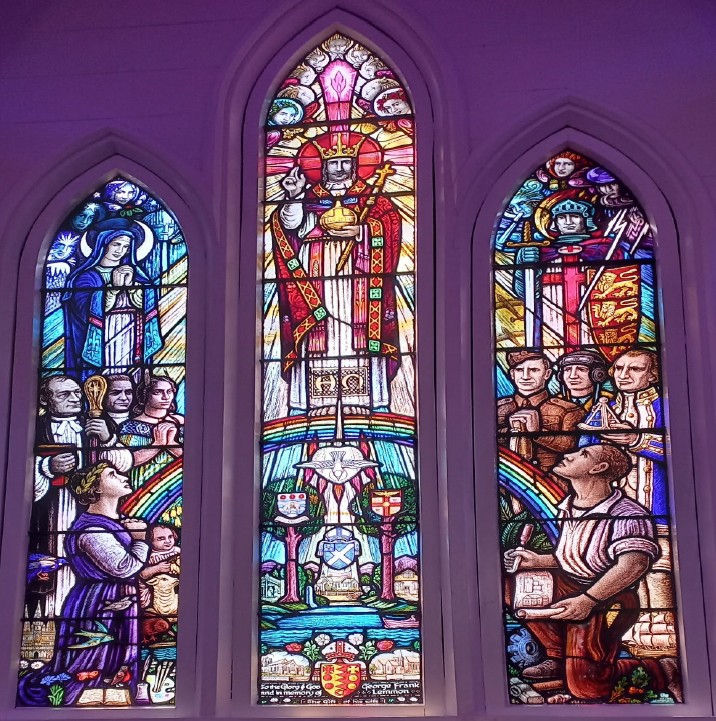Reflection by the Reverend Dr Deborah Broome
- biancasnee
- May 2, 2025
- 4 min read
Getting Rid of the Blind Spots
Meanwhile Saul, still breathing threats and murder against the disciples of the Lord, went to the high priest and asked him for letters to the synagogues at Damascus, so that if he found any who belonged to the Way, men or women, he might bring them bound to Jerusalem. Now as he was going along and approaching Damascus, suddenly a light from heaven flashed around him. He fell to the ground and heard a voice saying to him, ‘Saul, Saul, why do you persecute me?’ He asked, ‘Who are you, Lord?’ The reply came, ‘I am Jesus, whom you are persecuting. But get up and enter the city, and you will be told what you are to do.’ The men who were travelling with him stood speechless because they heard the voice but saw no one. Saul got up from the ground, and though his eyes were open, he could see nothing; so, they led him by the hand and brought him into Damascus. For three days he was without sight, and neither ate nor drank.
Now there was a disciple in Damascus named Ananias. The Lord said to him in a vision, ‘Ananias.’ He answered, ‘Here I am, Lord.’ The Lord said to him, ‘Get up and go to the street called Straight, and at the house of Judas look for a man of Tarsus named Saul. At this moment he is praying, and he has seen in a vision a man named Ananias come in and lay his hands on him so that he might regain his sight.’ But Ananias answered, ‘Lord, I have heard from many about this man, how much evil he has done to your saints in Jerusalem; and here he has authority from the chief priests to bind all who invoke your name.’ But the Lord said to him, ‘Go, for he is an instrument whom I have chosen to bring my name before Gentiles and kings and before the people of Israel; I myself will show him how much he must suffer for the sake of my name.’ So Ananias went and entered the house. He laid his hands on Saul and said, ‘Brother Saul, the Lord Jesus, who appeared to you on your way here, has sent me so that you may regain your sight and be filled with the Holy Spirit.’ And immediately something like scales fell from his eyes, and his sight was restored. Then he got up and was baptized, and after taking some food, he regained his strength. For several days he was with the disciples in Damascus, and immediately he began to proclaim Jesus in the synagogues, saying, ‘He is the Son of God.’
Acts 9:1-20
This is the first reading this coming Sunday – during the Easter season (which runs until Pentecost) we have readings from the book of the Acts of the Apostles, to highlight the growth of the early Church in the time after Jesus’ resurrection. Here we have an account of how Saul reoriented his life from being an enemy of the church to being an evangelist – as one scholar puts it, he moved from “persecutor to proclaimer.” We know him best as St Paul, the one whose mission was to speak of Christ to the Gentiles. Paul was a loyal Jew, a Pharisee no less, who wanted to destroy anything that dishonoured God. He was trying to do the right thing. But he had got it wrong, and he discovered suddenly and forcefully that the resurrected Jesus identified himself with those Jewish Christians who were being persecuted. Paul had to let go of his own way of looking at things and learn to see with Jesus’ own eyes – and it took being blinded to get him there.
There are two ways we can read this wrong. The first is to think that Paul’s “Damascus Road experience” is normative, the sort of thing everyone needs to go through when they start to take their faith seriously. Most people do not have such a sudden blinding realisation: for them coming closer to God is more like that other journey, the one on the road to Emmaus, a gradual coming to understand and to relate to Jesus in a new way.
The second is to be overly critical of Paul, not realising where we may have things in common with him. This is the classic example of a religious person so focused on doing good and on protecting God (as if God needed protection!) that they can’t see how destructive their way of working is. It’s worth asking ourselves about our own religious commitments: are they doing more harm than good? Are they stopping us from seeing the new thing that God is doing? What are our blind spots?
And how do we react to people with whom we disagree? This is where Ananias comes in. Not only did he think very differently from Saul/Paul, but as a follower of Jesus he too was at risk from the “threats and murder.” And yet he went to Paul and cared for him, in spite of his disagreement and his fear. That’s an example worth following.




Comments